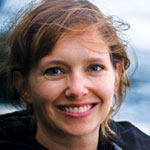 “People know what NPR sounds like,” says Vikki Valentine ’96, English. “But they don’t really know what it looks like. And on the Web, it’s what you look like that’s important.”
“People know what NPR sounds like,” says Vikki Valentine ’96, English. “But they don’t really know what it looks like. And on the Web, it’s what you look like that’s important.”
That’s the daily challenge for Valentine, who is a senior editor in NPR’s science division – and recipient of the 2010 UMBC Alumna of the Year Award in the Humanities. Public radio is changing at light speed; so much, in fact, that National Public Radio isn’t even National Public Radio anymore. In July, the name became simply NPR.
“The core product of NPR will always be audio storytelling,” says Valentine. “But people aren’t buying radios anymore. If you listen to NPR, you’re streaming it on your computer, you’re listening to it through your iPhone or your iPod…. NPR is trying to branch out and figure out what NPR is in that digital space.”
Valentine’s career trajectory has followed that rise in digital storytelling. UMBC professor of the practice in English Christopher Corbett helped guide her to a print journalism job with Baltimore Style after graduation. But within two years, Valentine was lured to The Baltimore Sun to work on the newspaper’s website – learning the ins and outs of the new medium on the job. “I knew nothing about the Web when I went to the Sun,” she recalls. “The only thing I had formal training in was reporting. UMBC gave me this great foundation in learning and asking questions and how to ask about things.”
A lifelong interest in science eventually took her from the Sun to Discovery magazine’s website, where she wrote daily science news. When that magazine shut down Valentine’s department after the dot.com bubble burst, she ended up at NPR. Over the last nine years, and in a variety of jobs, Valentine has helped reshape the way the organization tells its stories. In a medium that’s constantly changing, she says that flexibility and a knack for telling stories are key elements in her task.
“Most often someone comes to me with a story idea and we sit down and talk about that story and flesh it out,” she says. “Then we figure out what’s the best way to tell this story.”
One of features that Valentine has created at NPR.org is the Tiny Desk Kitchen. Inspired by the DIY spirit of NPR Music’s Tiny Desk Concerts, these videos examine the science behind popular notions about food (Does honey really have healing powers? Is grass-fed beef better for you than corn-fed beef?) and cap it off with a taste test in an improvised kitchen set up in an NPR cubicle.
In 2009, she was among a team of editors to win a National Academies of Science Award for excellence in reporting and communicating science, engineering and medicine. The award honored “Climate Connections,” a year-long multimedia series of stories looking at the complexities of the interplay between humans and the climate. It’s the sort of hybrid project – reported stories underscored by sound, web graphics and video – that shows the power of web journalism to unlock stories at multiple levels.
More recently, Valentine has worked with veteran storyteller Robert Krulwich on a series of science video and animation stories. For instance, a story of a group of space enthusiasts who manipulate and trade images from the Hubble and other space telescopes is accompanied by jaw-dropping images of a developing galaxy. Another story describes the crowded insect highway above our heads (around 3 billion insects strong) with a whimsical animation that visualizes the scientific details of spiders and beetles at 6,000 feet.
In September, Valentine will expand her responsibilities when she becomes the senior editor leading NPR’s environment, climate, and energy beat across all platforms.
“It’s a really fun time to be here,” Valentine says. “NPR is always saying to its staff: ‘Come up with something interesting, come up with something innovative.’ I’ve had lots of opportunities to do lots of different things, which keeps it interesting.” Whatever radio becomes, will Vikki Valentine be one of the journalists who will take it there?
“Hopefully,” she says. “That’s what I’m trying to be. I’ll let you know in ten years.”
— Mark Trainer

